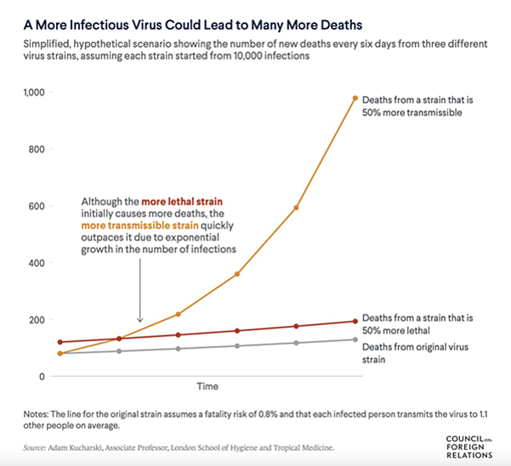How virus mutations could affect life in the city.
All viruses have a tendency to evolve over time. Random change in genetic structure is the basis of evolution. Covid-19 is caused by an RNA virus. RNA viruses have a tendency to evolve rapidly. The SARS-COV-2 virus has already undergone many thousands of mutations, indeed almost every single infection in Hong Kong has its own 'genetic fingerprint'. This is one of the ways we are able to connect infections to each other. We follow how closely the ‘fingerprints’ match. This is how scientists are able to tell if new infections have been imported into Hong Kong and also if they could have been picked up in quarantine hotels.
In late 2020, researchers in the UK identified a new variant which was shown to have 23 mutations some of which are on the gene that codes for the spike protein. This variant is now called the Alpha variant. Different variants were also recognised in South Africa (Beta variant), Brazil (Gamma variant), India (Delta variant) and South Africa (Omicron Variant). Whilst the exact position of the mutations are different they share a number of characteristics including change around the spike protein and evidence of increasing transmission rates. That is to say, these variants are more infectious. There is also some suggestion that they may be responsible for a change in the severity of illness, either more severe (Delta) or less severe (Omicron). They are responsible for the sudden and rapid increase in infections which we have seen throughout the world in different waves over the last two years.
As an example of the potential for an epidemic surge, the rapid expansion of the Alpha variant from the South East of England throughout the rest of the country is dramatically demonstrated in the video below. The darker colours represent the percentage of cases caused by the new variant over time.
The new variants have already spread worldwide. These variants have led to accelerations of the epidemic in the regions in which they seed. Epidemic modelling of the variant infections confirms an increase in the R0 values, an increase in the viral load and an effective increase in transmission rates for the variants of concern of around 50-70% for the Alpha variant, more recent investigations suggest that the Delta variant may be a further 40% more transmissible. The Omicron variant is even more transmissible. There have been some reports that the new variants may be associated with a change in disease severity but there are also factors of overwhelming of health systems during evolving epidemics. More research is needed to be certain about disease severity.
We have previously explained the important difference between the severity of a disease and the severity of an epidemic. Covid-19 has the potential to overwhelm health systems because of the rapid increase in numbers. The graph below demonstrates this issue. It compares a disease which is 50% more severe, continuing with slightly higher fatality rates, versus a disease which is 50% more infectious, producing a significant increase in mortality due to the rapid increase in the number of infected cases.

It is easy to lose sight of how well the epidemic has been managed in Hong Kong. Covid-19 is a mild disease in the majority of circumstances, but it has the potential to overwhelm health systems because of a potentially rapid increase in the numbers of infected patients. Avoiding excessive strain on the hospital system is one of the main goals of the public health controls. The new variants increase the risk of an epidemic taking hold and spreading quickly.
There are only two ways in which an individual or population can develop immunity, either by contracting the disease or through vaccination. The potential impact of these more infectious variants spreading through our densely populated city makes widespread infection a serious health threat. If an epidemic took hold in Hong Kong we would expect to see high mortality rates and significant stress to the health system. Vaccination remains the best way of developing population immunity and protecting both our population and health system. This is the reason that public health doctors are advocating so hard for population vaccination even though the current numbers in Hong Kong are so low.
In summary, we already knew that some mutations of the SARS-COV-2 virus appeared to make it more infectious. As we have previously explained, COVID-19 is not a serious disease in the majority of circumstances but rather it is the nature of the epidemic and particularly the tendency to overwhelm health systems which causes harm. Fortunately, we have very good evidence that public health measures in Hong Kong, in particular test, trace, isolate in association with social distancing and masks are highly effective and there is no reason to believe that they will not continue to be so. The real challenge now is to overcome vaccine hesitancy and drive vaccination rates higher so that we can begin to return our lives to normal.
Please note that all medical articles featured on our website have been reviewed by qualified healthcare doctors. The articles are for general information only and are not medical opinions nor should the contents be used to replace the need for a personal consultation with a qualified medical professional on the reader's medical condition.